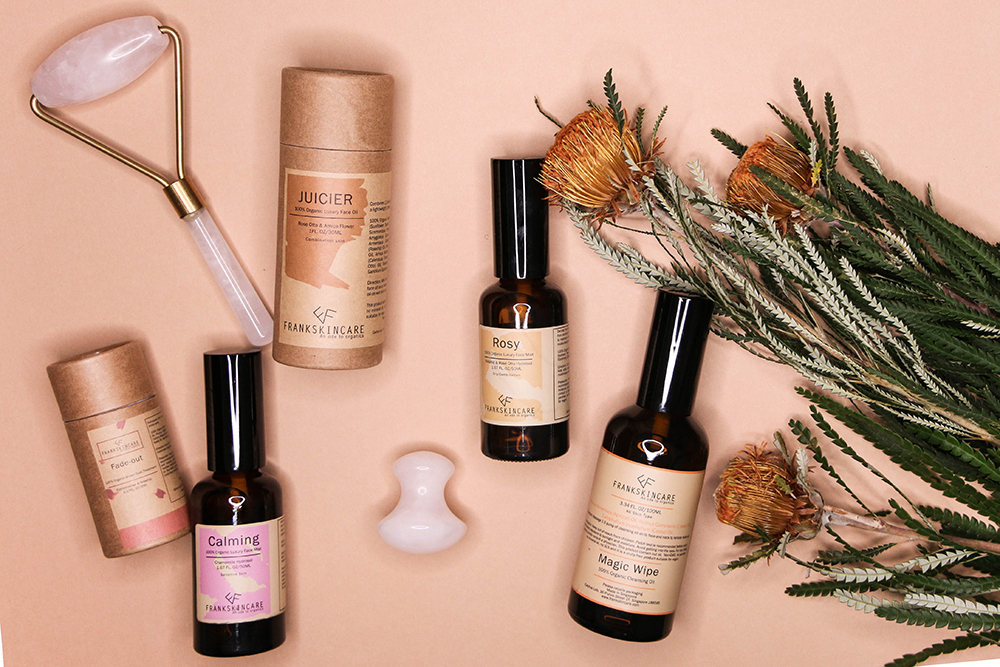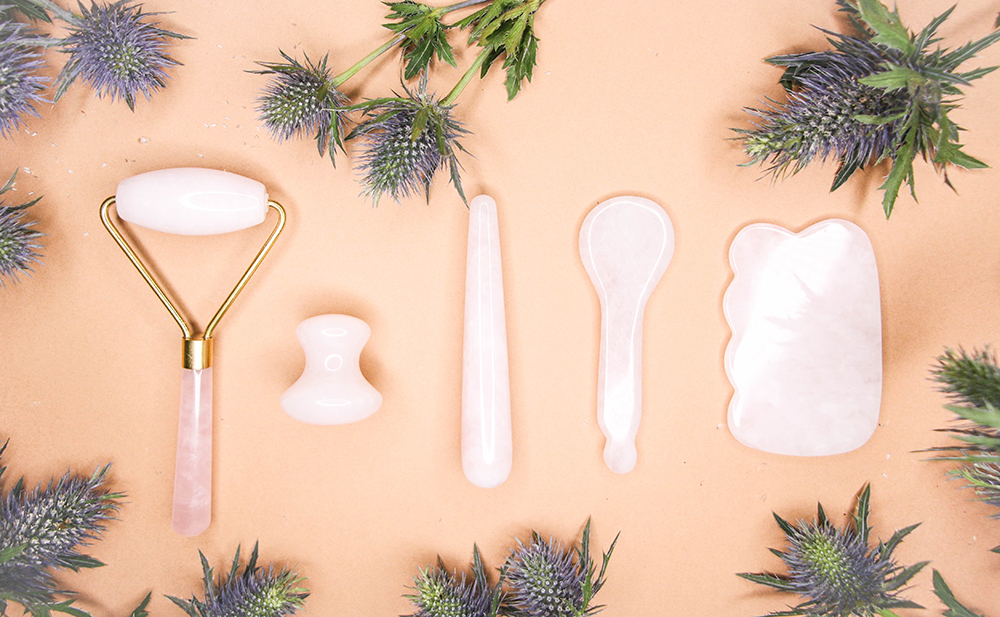Whether you were born in Asia or simply relocated here, your skin will probably never acclimatize because let’s face it, what is humidity good for anyway? Sure, there is anti-shine this and anti-frizz that, but is it organic? Is it good for the environment? Is it conscious? Well, FrankSkincare is. You’ll want to sit down for this…
Cissy Chen, the creator, owner and innovative #GirlBoss of FrankSkincare, thinks we need to know a thing or two about our skin and what we put on it. In fact, she’s made it her mission to create products that debunk everything we thought we knew (like who knew scrubs are bad) about the way take care of our skin. As such, her luxury organic skincare line looks to simplify your daily skincare regimen down to only what is essential.
Born out of a need to address her own very sensitive skin needs coupled with a passion for sustainability, Cissy has done what all entrepreneurs set out to do and transformed her dreams into those of an entire region all living in very similar conditions. Evoking an artisan feel and employing a small batch approach, FrankSkincare has been praised for seamlessly marrying science with beauty for those living in hot and humid Asia.
We picked Cissy’s brain and asked her all the questions that we thought would help us on our lifelong quest to achieve perfect skin, and let us tell you, today we feel like this might not be so far off.

GITNB: Most conscious brands have a passionate reason for being. What’s the mantra or motto that FrankSkincare swears by?
FrankSkincare: The purpose of the brand is to provide an Asian-based skincare formulation that is right for around the region but of course sticking to the values of being 100% organic. We use only 100% organic certified ingredients because they have less impact on our bodies as well as the environment. We are also against animal testing and everything is done in small batches. Then, our packaging is either recycled material or recyclable material.
The terms ‘natural’ and ‘organic’ are used so often these days but a lot of people don’t know the difference between the two. Can you enlighten us?
So when it comes to natural products, we’re purely talking about the ingredients itself. When something is organic, it means that throughout the whole planning process there are no synthetic chemicals involved. Organic also doesn’t support GMO seeds, plantations, or approve any animal testing at any point. So that’s the difference between natural and organic but I understand that in general, the opinion of natural and organic products are more or less very confusing or similar.
Then, there are brands that have got this very natural inspired branding but they probably only use one or two natural ingredients and it’s always down in the list in the last few ingredients. With our products, we want to make sure that we are offering something where there is no confusion. We don’t go about just claiming our products are organic, like some organic products that probably only contain a certain percentage, we do 100% organic.
How can we tell if a brand is really natural or organic then? Is there something that the average person should be looking out for to determine if the claim is legit?
Even before understanding if a product is natural or organic, it’s more important that we understand that every single product that we buy is actually a conscious choice. So, whenever you purchase a product, by simply looking at the entire ingredient list you can see if recognize anything listed. For anything that you cannot recognize, you can easily look up those ingredients and be able to tell if they are naturally benefiting your skin (and ensure they aren’t causing any harm to your body in general).
This is just the first step. The second step is to try to find brands that have got a very authentic story that you can truly trust. And then, of course, you can always ask, make inquiries, and send emails to the brands to ask more in details about the ingredients. If you want to see the certificates of each of these ingredients, I think it’s also your right to ask for this if it’s not already online.
We are told time and time again that if we don’t know what an ingredient is, don’t use it. But it happens. What are some of the ingredients that we should really try to remember to stay away from?
A really common one is paraben, which is commonly used in preservatives. Then, there is also SLS. SLS comes in many different forms and it’s usually found in things like shampoos, body wash and facial wash. These are more or less the more common ones to stay away from.
But then what I usually tell people is to also lookout for products that contain different types of acid as well. I know acid does help some people to exfoliate effectively so then it all boils down to determining whether it is actually suitable for an individual. A lot of people don’t understand the danger of using products that contain acid and so it becomes very reactive on their skin. If they already have sensitive or acne-prone skin, and they use products like this over a prolonged period, it might also make their skin more and more sensitive.
Alternatively, what secret ingredient or do you think people should know about?
Nature really has got a lot to offer. In my position, I definitely encourage people to try to adopt more natural ingredients because natural ingredients contain multiple vitamins, antioxidants, omegas, and many other skin beneficial nutrients, so naturally, I tell people to start here. I’m not saying that synthetic ingredients are entirely bad, but I think it’s easier to look for ingredients that are beneficial from what nature already offers.
In the days of Instagram and influencers, we are forever falling for things like greenwashing. What are some of the biggest misconceptions about the natural skincare that you can debunk for us?
To start, things like coconut oil might not be suitable for all skin types. Even though it’s natural, it doesn’t mean everyone should be using. That’s especially true for those who are acne-prone. The second thing is that even if a product like a scrub is natural, it also might not be right for everyone’s skin as well. Even if it’s a natural scrub, if you remember how crystallization is formed, then sugar is one of the most common ingredients. Some people even go to the extreme of using apricot kernels and grind it to a smaller particle, or they use nutshells which are even more dangerous because they really create a lot of micro-injuries on our skin. And in this case, our skin is constantly healing.
At the end of the day, it’s just really more about using due diligence to find out more about the products that we use on a daily basis. As I say, if you intend to use a particular brand for more than one year, then all the more reason you need to know what you’re putting into your body.
So what about greenwashing, are you aware of any instances of this that happens regularly around Asia we should be wary of?
I’ve come across so many Asian skincare brands that probably use social media images, or that their storefront looks very natural with a lot of plant looking deco or at least have this wood and green kind of look. I think a lot of customers naturally gravitate towards such brands and they stop looking at the ingredient list. Of these kinds of brands, I discovered that a lot of them actually have only about two of 20 ingredients that are truly natural, and the rest are made up of different types of stabilizers, preservatives, fragrance, alcohols, and synthetic ingredients that you can hardly find any information on.

What changes do you think need to happen in the beauty-sphere as a whole?
While I’m really glad that there is an organic certification process around the world, I wish there was a standardized procedure for all the brands out there all over the world so that consumers can stick to one standard certification process and filter out the brands that are truly natural or organic.
Also, the current certification process should also be a lot stricter than what it is right now. To get the ingredients themselves certified organic, they have to go through a vetting process of the entire farmland including resources like water, nearby pollution and things like that. But when it comes to products, some in this country only requires 70% natural and 30% organic. And that is very common. So yeah, I just wish these standards can be a bit stricter.
Suppose we wanted to introduce a girlfriend to FrankSkincare, what’s a good place to start? What are your best sellers?
Well, I actually most of us don’t need a lot of products. And if we take out all those things that are not necessary, like foaming cleansers and scrubs, then we only need to focus on products that truly pack our skin with the right nutrients. So the first thing that I will recommend is a basic cleaning oil to help remove makeup and sunscreen because these are all oil-based products. So using a cleansing oil helps remove all these products effectively while cleansing your pores, which is also a good alternative to a very harsh cleanser.
The second thing that I recommend is basically our face mist, which is made of pure plant-based hydrosol so there is no alcohol. This can also be a good alternative to a regular toner which usually contains alcohol and gives you the effect of sudden hydration, but is actually more like the evaporation of alcohol. Hydrosol truly helps to hydrate the skin and also tone the appearance of pores.
The third thing is our face oil, which is also our most popular product. It contains 11 different ingredients, which contain all the right range of vitamins, antioxidants and omegas. And it’s developed for our region so we can still use this to protect our skin and to help regulate T-zone oiliness in this humid weather
For people like me, who aren’t ready to abandon their entire skincare regimen but want to ‘go green’, what are the #LittleGreenSteps that people can start to explore?
I’m not someone who encourage people to throw away everything and then replace everything with organic-only products. That applies not just to skincare, but to your clothes and your household products as well.
I think it’s very important that you take one step at a time. Only when you finish a product and you are looking to make your next purchase is when you should think about making a more conscious choice. To start, give yourself more time. I definitely encourage consumers to truly take their time to do their own research. It doesn’t have to be really in-depth, but at least look for brands that truly coincide with your values. Let’s say you’re someone who is really big on the environment, then make sure the products that you buy have also really focused their effort on preserving natural resources as well as protecting our environment around us.
Shop FrankSkincare’s entire line here and connect with them on Instagram and Facebook.

